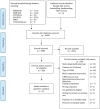Effect of computerised, knowledge-based, clinical decision support systems on patient-reported and clinical outcomes of patients with chronic disease managed in primary care settings: a systematic review
- PMID: 34937723
- PMCID: PMC8705223
- DOI: 10.1136/bmjopen-2021-054659
Effect of computerised, knowledge-based, clinical decision support systems on patient-reported and clinical outcomes of patients with chronic disease managed in primary care settings: a systematic review
Abstract
Objectives: Chronic diseases are the leading cause of disability globally. Most chronic disease management occurs in primary care with outcomes varying across primary care providers. Computerised clinical decision support systems (CDSS) have been shown to positively affect clinician behaviour by improving adherence to clinical guidelines. This study provides a summary of the available evidence on the effect of CDSS embedded in electronic health records on patient-reported and clinical outcomes of adult patients with chronic disease managed in primary care.
Design and eligibility criteria: Systematic review, including randomised controlled trials (RCTs), cluster RCTs, quasi-RCTs, interrupted time series and controlled before-and-after studies, assessing the effect of CDSS (vs usual care) on patient-reported or clinical outcomes of adult patients with selected common chronic diseases (asthma, chronic obstructive pulmonary disease, heart failure, myocardial ischaemia, hypertension, diabetes mellitus, hyperlipidaemia, arthritis and osteoporosis) managed in primary care.
Data sources: Medline, Embase, CENTRAL, Scopus, Health Management Information Consortium and trial register clinicaltrials.gov were searched from inception to 24 June 2020.
Data extraction and synthesis: Screening, data extraction and quality assessment were performed by two reviewers independently. The Cochrane risk of bias tool was used for quality appraisal.
Results: From 5430 articles, 8 studies met the inclusion criteria. Studies were heterogeneous in population characteristics, intervention components and outcome measurements and focused on diabetes, asthma, hyperlipidaemia and hypertension. Most outcomes were clinical with one study reporting on patient-reported outcomes. Quality of the evidence was impacted by methodological biases of studies.
Conclusions: There is inconclusive evidence in support of CDSS. A firm inference on the intervention effect was not possible due to methodological biases and study heterogeneity. Further research is needed to provide evidence on the intervention effect and the interplay between healthcare setting features, CDSS characteristics and implementation processes.
Prospero registration number: CRD42020218184.
Keywords: general medicine (see internal medicine); health informatics; preventive medicine; primary care.
© Author(s) (or their employer(s)) 2021. Re-use permitted under CC BY-NC. No commercial re-use. See rights and permissions. Published by BMJ.
Conflict of interest statement
Competing interests: RI and NM are employees of Cerner UK, a health technology organisation. AJV-V reports past or current participation in investigator-initiated research grants to Imperial College London from Pfizer, Amgen, Sanofi, MSD, Daiichi Sankyo and Regeneron, honoraria for lectures from Amgen, Mylan and Akcea, and steering committee/consulting fees from Radcliffe Cardiology and Bayer, all outside the submitted work. KID reports past or current participation in investigator-initiated research grants to Imperial College London from Amgen, Sanofi, MSD, Daiichi Sankyo and Regeneron and consulting fees from Bayer, all outside the submitted work.
Figures


References
-
- CDC . Health and economic costs of chronic diseases. Available: https://www.cdc.gov/chronicdisease/about/costs/index.htm
-
- WHO . Innovative care for chronic conditions: building blocks for action. Available: http://www.who.int/chp/knowledge/publications/icccreport/en/
